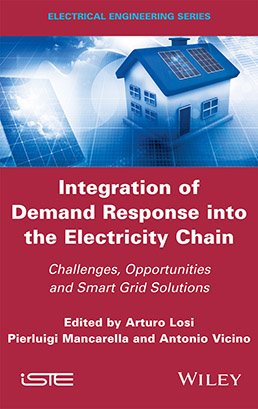
In the last two decades, the power industry has undergone unprecedented changes motivated by challenging environmental targets set out by governments worldwide, increasing requirements in terms of security of supply, and the need for making electricity more affordable to end customers in a market environment. The increasing share of renewable energy sources, such as wind and photovoltaics connected to networks at different voltage levels, is dramatically changing the classic predict-and-provide approach that has characterized the power sector since its dawn at the end of the 19th Century.
The primary aim of Demand Response (DR) is to overcome the “traditional” inflexibility of electrical demand and, amongst other benefits, create a new powerful tool to maximize deployment of renewable energy sources as well as provide active network management solutions to help reduce the impact of limited grid capabilities.
This book presents, for the first time, a comprehensive view on technical methodologies and architectures, commercial arrangements, and socio-economic and regulatory factors that could facilitate the uptake of DR.
1. Demand Response in Smart Grids, Amir Abiri-Jahromi, Navdeep Dhaliwal and François Bouffard.
2. Active Consumer Characterization and Aggregation, Alessandro Agnetis, Ignacio Delgado Espinós, Joseba Jimeno Huarte, Marco Pranzo and Antonio Vicino.
3. Distributed Intelligence at the Consumer’s Premises, Alessandro Agnetis, Colin Brown, Paolo Detti, Joseba Jimeno Huarte and Antonio Vicino.
4. Distribution Control Center: New Requirements and Functionalities, Lilia Consiglio, Anna Rita Di Fazio, Simone Paoletti, Mario Russo, Adrian Timbus and Giovanni Valtorta.
5. Distribution Network Representation in the Presence of Demand Response, Giovanni M. Casolino, Arturo Losi, Christian Noce and Giovanni Valtorta.
6. Communication Needs and Solutions for the Deployment of Demand Response, Tatjana Kostic, Dacfey Dzung and Adrian Timbus.
7. System-level Benefits of Demand Response, Pedro Linares, Mercedes Vallés, Pablo Frías, Adela Conchado and Óscar Lago.
8. Techno-Economic Analysis of Demand Response, Daan Six, Eduardo Alejandro Martínez Ceseña, Carlos Madina, Kris Kessels, Nicholas Good and Pierluigi Mancarella.
9. Socioeconomic Aspects of Demand Response, Sarah Mander, Dana Abi Ghanem, Régine Belhomme, Ignacio Delgado Espinós, Roberto Gonzalez Sainz-Maza, Kris Kessels and Marina Lombardi.
10. Looking Forward: Gaps and Enablers for Wide Scale Demand Response Deployment, Arturo Losi, Pierluigi Mancarella and Antonio Vicino.
Arturo Losi is Professor of Power Systems at the University of Cassino and LM, Italy. His research interests include modeling of, and optimization in, power systems, and distribution systems modeling.
Pierluigi Mancarella is a Reader in Future Energy Networks at the University of Manchester, UK, where he teaches in the School of Electrical and Electronic Engineering. His areas of interest include techno-economic and environmental modeling of multi-energy systems, integration of low carbon technologies into power systems, planning of integrated energy infrastructure under uncertainty, business models for smart technologies, and risk and resilience assessment of future networks.
Antonio Vicino is Professor of Control Systems at the University of Siena, Italy. His research interests include identification of nonlinear systems, smart grids, robust control of uncertain systems, stability analysis of nonlinear systems, time series analysis and prediction, systems biology and applied system modeling.